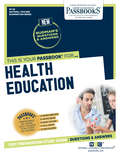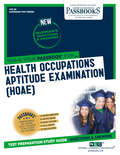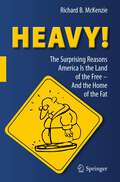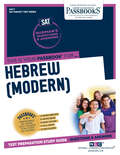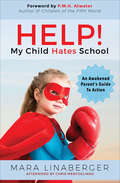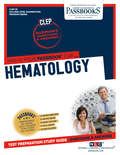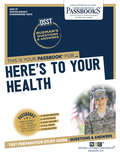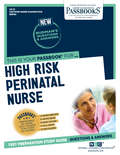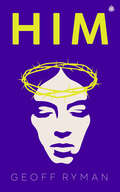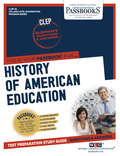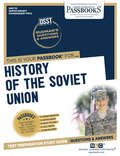- Table View
- List View
HEALTH EDUCATION: Passbooks Study Guide (National Teacher Examination Series (NTE) #T-24)
by National Learning CorporationThe National Teacher/PRAXIS Examinations are designed to provide objective measurement of the knowledge, skills and abilities required of teachers. The Passbook® for the Health Education exam provides hundreds of multiple-choice questions in the areas that will likely be covered on your upcoming certification test.
HEALTH OCCUPATIONS APTITUDE EXAMINATION: Passbooks Study Guide (Admission Test Series)
by National Learning CorporationThe Admission Test Series prepares students for entrance examinations into college, graduate and professional school as well as candidates for professional certification and licensure. The Health Occupations Aptitude Examination (HOAE) Passbook® prepares you by sharpening the skills and abilities necessary to succeed on your upcoming entrance exam. It provides hundreds of questions and answers in the areas that will likely be covered on your upcoming exam, including but not limited to: spelling and vocabulary; basic arithmetic; reading comprehension; natural sciences; and more.
HEAVY!
by Richard B. MckenzieAmerica's emerging "fat war" threatens to pit a shrinking population of trim Americans against an expanding population of heavy Americans in raging policy debates over "fat taxes" and "fat bans." These "fat policies" would be designed to constrain what people eat and drink - and theoretically crimp the growth in Americans' waistlines and in the country's healthcare costs. Richard McKenzie's HEAVY! The Surprising Reasons America Is the Land of the Free--And the Home of the Fat offers new insight into the economic causes and consequences of America's dramatic weight gain over the past half century. It also uncovers the follies of seeking to remedy the country's weight problems with government intrusions into people's excess eating, arguing that controlling people's eating habits is fundamentally different from controlling people's smoking habits. McKenzie controversially links America's weight gain to a variety of causes: the growth in world trade freedom, the downfall of communism, the spread of free-market economics, the rise of women's liberation, the long-term fall in real minimum wage,and the rise of competitive markets on a global scale. In no small way - no, in a very BIG way - America is the "home of the fat" because it has been for so long the "land of the free." Americans' economic, if not political, freedoms, however, will come under siege as well-meaning groups of "anti-fat warriors" seek to impose their dietary, health, and healthcare values on everyone else. HEAVY! details the unheralded consequences of the country's weight gain, which include greater fuel consumption and emissions of greenhouse gases, reduced fuel efficiency of cars and planes, growth in health insurance costs and fewer insured Americans, reductions in the wages of heavy people, and required reinforcement of rescue equipment and hospital operating tables. McKenzie advocates a strong free-market solution to how America's weight problems should and should not be solved. For Americans to retain their cherished economic freedoms of choice, heavy people must be held fully responsible for their weight-related costs and not be allowed to shift blame for their weight to their genes or environment. Allowing heavy Americans to shift responsibility for their weight gain can only exacerbate the country's weight problems.
HEBREW: Passbooks Study Guide (College Board SAT Subject Test Series)
by National Learning CorporationSAT Subject Tests, developed by the College Board, are required by many colleges and universities as part of their admission requirements. The SAT Hebrew (Modern) Passbook® prepares you for your test by allowing you to take practice exams modeled after the real SAT Subject Test. It provides hundreds of questions and answers similar to the ones you will find on your upcoming exam.
HELP! My Child Hates School: An Awakened Parent's Guide to Action
by Mara LinabergerA veteran educator tackles the many difficulties kids face in school—from bullying to lack of motivation—with strategies to help your child love learning. Is your child depressed, unmotivated, resentful, or angry when it&’s time to go to school each morning? Does your child come home with stories of being bullied or made fun of? Does your child possess unusual talents that go unrecognized at school―or, worse, is he or she seen as strange by teachers or peers? If you answered yes to any of these questions, help has arrived. HELP! My Child Hates School cuts to the root of your child&’s school issues and shows you practical ways to turn the situation around, getting your child out of misery and back to thriving. Along the way, Mara Linaberger, an educational innovator with more than twenty-five years of experience, will share stories, tips, and tricks to help instill a love for learning in your child! If your child can&’t last another day in school, and you&’ve had it with the fighting, crying, and coercing, HELP! My Child Hates School is for you.
HEMATOLOGY: Passbooks Study Guide (College Level Examination Program Series (CLEP))
by National Learning CorporationThe College Level Examination Program (CLEP) enables students to demonstrate college-level achievement and earn college credit in various subject areas based on knowledge acquired through self-study, high school and adult courses, or through professional means. The CLEP Hematology Passbook® prepares you by sharpening knowledge of the skills and concepts necessary to succeed on the upcoming exam and the college courses that follow. It provides a series of informational texts as well as hundreds of questions and answers in the areas that will likely be covered on your upcoming exam.
HEN 101 -2 Hindi Va Ingraji Bhashancha Adhishthan Abhyaskram F.Y.B.A. - Y.C.M.O.U.
by Pra. ThakarHEN 101 Hindi Va Ingraji Bhashancha Adhishthan Abhyaskram Karyapustika text book for F.Y.B.A from Yashwantrao Chavan Maharashtra Open University, Nasik in Hindi and English.
HEN 101Hindi Va Ingraji Bhashancha Adhishthan Abhyaskram F.Y.B.A. - Y.C.M.O.U.
by M. B. Shaha Pra. ThakarHEN 101 Hindi Va Ingraji Bhashancha Adhishthan Abhyaskram text book for F.Y.B.A from Yashwantrao Chavan Maharashtra Open University, Nasik in Hindi and English.
HERE'S TO YOUR HEALTH: Passbooks Study Guide (DANTES Subject Standardized Tests (DSST))
by National Learning CorporationThe DSST Subject Standardized Tests are comprehensive college and graduate level examinations given by the Armed Forces, colleges and graduate schools. These exams enable students to earn college credit for what they have learned through self-study, on the job, or by other non-traditional means. The DSST Here’s To Your Health Passbook® prepares candidates for the DSST exam, which enables schools to award credit for knowledge acquired outside the normal classroom environment. It provides a series of informational texts as well as hundreds of questions and answers in the areas that will likely be covered on your upcoming exam, including but not limited to: mental health and behavior; human development and relationships; substance abuse; fitness and nutrition; and more.
HIGH RISK PERINATAL NURSE: Passbooks Study Guide (Certified Nurse Examination Series)
by National Learning CorporationThe Certified Nurse Examination Series prepares individuals for licensing and certification conducted by the American Nurses Credentialing Center (ANCC), the National Certification Corporation (NCC), the National League for Nursing (NLN), and other organizations. The High Risk Perinatal Nurse Passbook® provides a series of informational texts as well as hundreds of questions and answers in the areas that will likely be covered on your upcoming exam.
HIM
by Geoff RymanThe long-awaited new book from multi-award winner Geoff RymanAn extraordinary science-fiction novel about identity, divinity and alternate reality – the story of the son of God.&“Women, of course, can not be sons of God,&”In the village of Nazareth, virgin Maryam and the wife of Yosef barLevi gives birth to a miracle: a little girl. She is named Avigayil, after her grandmother.But as Avigayil grows, it&’s clear she believes that she is destined to be someone greater than just the daughter of Maryam. From leading a gang of village boys to challenging the priests in the temple, Avigayil is determined to find her way as Yeshu, a man.Yeshu can work miracles. He can see futures. He can speak for God. A gripping, thoughtful sci-fi novel, tackling family, the multiverse and the survival of love through immense change and crisis.File Under: Science Fiction [ The Greatest Story Never Told | Child of The Faith | Apocrypha | Herstory ]
HIN 213 Hindi Kathetar Sahitya S.Y.B.A. - Y.C.M.O.U
by Suryanarayan Ransubhe M. B. Shah Vishwas KrishnabariHIN 213 Hindi Kathetar Sahitya text book for S.Y.B.A from Yashwantrao Chavan Maharashtra Open University, Nashik in Hindi.
HIN 260 Kavita Swarup Aur Vivechan T.Y.B.A. Y.C.M.O.U.
by Chandrakant KanhaiyalalHIN 260 Kavita : Swarup Aur Vivechan text book for T.Y.B.A from Yashwantrao Chavan Maharashtra Open University, Nashik in Hindi.
HIN 262 Hindi Me Navjagaran T.Y.B.A - Y.C.M.O.U.
by M. B. Shaha Suryanarayan RanbhuseHIN 262 : Hindi Me Navjagaran text book for T.Y.B.A from Yashwantrao Chavan Maharashtra Open University, Nashik in Hindi.
HIN 264 Prayojanmulak Hindi T.Y.B.A - Y.C.M.O.U
by Sudhakar Gokakkar Damodar Khadase Bhimrav PatilHIN 264 Prayojanmulak Hindi text book for T.Y.B.A from Yashwantrao Chavan Maharashtra Open University, Nashik in Marathi.
HIN 307 Anuvad Swarup Aur Vivechan T.Y.B.A. Y.C.M.O.U.
by Prof. Dr. Padma Patil Damodar Khadase Prof. ThakarHIN 307 Anuvad : Swarup Aur Vivechan text book for T.Y.B.A from Yashwantrao Chavan Maharashtra Open University, Nashik in Hindi.
HIS 220 Adhunik Bharatacha Itihas S.Y.B.A - Y.C.M.O.U
by Arun Joshi Prof. N.C. Dixit Prof. Manohar R. Kulkarni Prof. Dixit Prof. Thakurdesai Arun BhosaleHIS 220 Adhunik Bharatacha Itihas text book for S.Y.B.A from Yashwantrao Chavan Maharashtra Open University, Nashik in Marathi.
HIS 221 Adhunik Jagacha Itihas (1775 Te 1925) S.Y.B.A - Y.C.M.O.U.
by Prabhakar Dev N. G. Bhavare Prof. Kamble Shanta Kothekar Prof. NevaskarHIS 221 Adhunik Jagacha Itihas (1775 Te 1925) text book for S.Y.B.A from Yashwantrao Chavan Maharashtra Open University, Nashik in Marathi.
HIS 280 Prachin Bharat (Prarambh Te Yadav Kal) T.Y.B.A - Y.C.M.O.U
by Prof. Dr. R. Shri. Morvandhikar Prof. Dr. Prabhakar Dev Prof. Dr. Sau. Saral DharankarHIS 280 Prachin Bharat (Prarambh Te Yadav Kal) text book for T.Y.B.A from Yashwantrao Chavan Maharashtra Open University, Nashik in Marathi.
HIS 281 Madhyayugin Bharat (1206 Te 1857) T.Y.B.A - Y.C.M.O.U
by Prof. Dr. Sau Saral Dharankar Prof. Dr. B. D. KhuneHIS 281 Madhyayugin Bharat (1206 Te 1857) text book for T.Y.B.A from Yashwantrao Chavan Maharashtra Open University, Nashik in Marathi.
HIS 282 Bharatiy Stri Jivanachi Vatchal T.Y.B.A - Y.C.M.O.U
by Prof. Dr. Sau. Saral Dharankar Prof. R. N. Gayadhani Prof. Dr. T. T. MahajanHIS 282 Bharatiy Stri Jivanachi Vatchal text book for T.Y.B.A from Yashwantrao Chavan Maharashtra Open University, Nashik in Marathi.
HIS 283 Sark Deshancha Itihas HIS 283 T.Y.B.A - Y.C.M.O.U
by Prof. R. P. Bhamare Prof. Dr. B. D. Khane Prof. SatbhaiHIS 283 Sark Deshancha Itihas text book for T.Y.B.A from Yashwantrao Chavan Maharashtra Open University, Nashik in Marathi.
HIS 285 Vividhatetil Ekata T.Y.B.A - Y.C.M.O.U
by Prabhakar Dev N. G. Bhavare M. B. Shaha M. B. Kulkarni Ramkrushna Metkar.HIS 285 Vividhatetil Ekata text book for T.Y.B.A from Yashwantrao Chavan Maharashtra Open University, Nashik in Marathi.
HISTORY OF AMERICAN EDUCATION: Passbooks Study Guide (College Level Examination Program Series (CLEP) #Clep-16)
by National Learning CorporationThe College Level Examination Program (CLEP) enables students to demonstrate college-level achievement and earn college credit in various subject areas based on knowledge acquired through self-study, high school and adult courses, or through professional means. The CLEP History of American Education Passbook® prepares you by sharpening knowledge of the skills and concepts necessary to succeed on the upcoming exam and the college courses that follow. It provides a series of informational texts as well as hundreds of questions and answers in the areas that will likely be covered on your upcoming exam.
HISTORY: Passbooks Study Guide (DANTES Subject Standardized Tests (DSST) #Vol. Ap-1)
by National Learning CorporationThe DSST Subject Standardized Tests are comprehensive college and graduate level examinations given by the Armed Forces, colleges and graduate schools. These exams enable students to earn college credit for what they have learned through self-study, on the job, or by other non-traditional means. The DSST Rise and Fall / History of the Soviet Union Passbook® prepares candidates for the DSST exam, which enables schools to award credit for knowledge acquired outside the normal classroom environment. It provides hundreds of questions and answers in the areas that will likely be covered on your upcoming exam, including but not limited to: World War I and II; economic policies; reform and collapse; leaders and their policies; and more.
